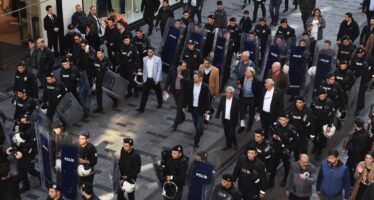Fears for the life of kurdish activist
Print this article
Font size -16+
![]()
Jakarkhon Sheikho ‘Ali, aged 28, was arrested on the evening of 20 June,
apparently by Syrian Military Security. For the first week of Jakarkhon Sheikho
‘Ali’s detention, his family did not have any information regarding his fate or
whereabouts. Through an indirect source they have found out that he is being
detained by the Military Security Branch in Aleppo. Syrian human rights
organizations and Syrian Kurdish political parties believe that Jakarkhon Sheikho
‘Ali has been detained by Syrian Military Security because of his activities as a
senior member of the Kurdish Democratic al-Wifaq Party, an unauthorized urdish Syrian political party.
Two previous attempts to arrest Jakarkhon Sheikho ‘Ali had failed. In early 2008, a patrol by Political Security, a
separate security force, raided his then home in ‘Efrin, a town near Aleppo, but he was out at the time. A Military
Security patrol raided his new home in Aleppo in February 2009, and again he was out. Jakarkhon Sheikho ‘Ali was
also summoned for interrogation on at least three occasions in 2009 by either Political or Military Security but was
not detained on any of them.
apparently by Syrian Military Security. For the first week of Jakarkhon Sheikho
‘Ali’s detention, his family did not have any information regarding his fate or
whereabouts. Through an indirect source they have found out that he is being
detained by the Military Security Branch in Aleppo. Syrian human rights
organizations and Syrian Kurdish political parties believe that Jakarkhon Sheikho
‘Ali has been detained by Syrian Military Security because of his activities as a
senior member of the Kurdish Democratic al-Wifaq Party, an unauthorized urdish Syrian political party.
Two previous attempts to arrest Jakarkhon Sheikho ‘Ali had failed. In early 2008, a patrol by Political Security, a
separate security force, raided his then home in ‘Efrin, a town near Aleppo, but he was out at the time. A Military
Security patrol raided his new home in Aleppo in February 2009, and again he was out. Jakarkhon Sheikho ‘Ali was
also summoned for interrogation on at least three occasions in 2009 by either Political or Military Security but was
not detained on any of them.
Related Articles
Police harassment of HDP deputies continues
![]()
HDP lawmakers met in Istiklal Street despite being surrounded and harassed by police to hand out leaflets to call for
UN PRIMO PASSO PER IL PROCESSO DEMOCRATICO: PRINCIPI E VOLONTA’ DELLA SINISTRA ABERTZALE
![]()
UN PRIMO PASSO PER IL PROCESSO DEMOCRATICO: PRINCIPI E VOLONTA DELLA SINISTRA ABERTZALE Siamo indipendentisti, donne e uomini di diverse
19 MARZO, ORE 17.54: GUERRA ALLA LIBIA
![]()
19 marzo, h 17.54 Un velivolo francese colpisce un mezzo militare libico di terra. Inizia così la nuova guerra “giusta”
No comments
Write a comment
No Comments Yet!
You can be first to comment this post!



